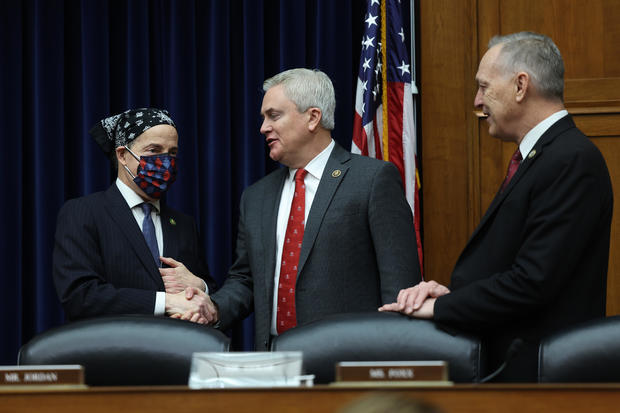House to vote on plan to end telework for hundreds of thousands of federal workers
The House of Representatives is expected Wednesday to pass legislation requiring hundreds of thousands of federal workers to return to federal offices and shutter many of the telework arrangements permitted amid the COVID-19 pandemic.
Though the measure is unlikely to be passed into law, the proposal raises new debate over whether telework by public employees is squandering taxpayer money or is preventing a shortfall of the civil servants needed to operate the sweeping U.S. government.
Republican Rep. James Comer of Kentucky, chairman of the House Oversight Committee, said services at the Internal Revenue Service, Social Security Administration and Department of Veterans are suffering, and backlogs of claims are worsening, because of overuse of telework by federal employees.
“We’re not saying no one can telework,” Comer said. “We just want those levels back to what they were before COVID. Because we believe there are a lot of federal employees who have taken advantage of the situation.”
A CBS News review of U.S. Office of Personnel Management data and reports shows the number of federal employees who have been approved for telework or remote work has nearly doubled since 2018, with the sharpest increases after March 2020.
Kevin Dietsch / Getty Images
In 2018, government records showed approximately 483,000 telework employees. By 2021, the number had eclipsed 1,000,000 workers, according to the records.
The current legislation, titled the “SHOW UP Act,” would order federal executive branch agencies ” reinstate and apply the telework policies, practices, and levels of the agency as in effect on December 31, 2019.” The legislation would require executive branch agencies to do so within 30 days of the bill being signed into law.
Republican Rep. Bob Good of Virginia told CBS News, “Everybody should come back to the office and do what the American people have to do. Certainly, if you’re a federal employee, the standard ought to be higher.”
The legislation is expected Wednesday to draw a party-line vote on the House floor and is not likely to be taken up by the Democratic-controlled Senate. But multiple House staffers told CBS News that Republicans could leverage House passage of the bill to try to include telework restrictions into the must-pass year-end spending bills.
Federal workers said telework and remote work assignments improve efficiency and performance.
Valencia McIntyre-Dubose, a benefits processor for the U.S. Department of Veterans Affairs for 23 years and a union representative for VA employees with the American Federation of Government Employees, said telework has made her more efficient and helped her better serve veterans.
“I get my work done faster and easier,” McIntyre-Dubose said. A resident of Maryland, she said she saves time commuting through thick Washington, D.C. traffic to her office.
Rep. Jamie Raskin of Maryland, the ranking Democrat on the House Oversight Committee, said telework is increasingly being utilized by the private sector to help recruit employees and make operations more efficient.
“The American workplace is changing because of extraordinary new technology, and a new focus on productivity and efficiency, as opposed to industrial age, assembly line, seating and command and control work relations,” Raskin said during a debate Monday over the legislation in the US House Rules Committee.”We cannot enter a time machine and simply disappear the utility of telework in recruiting and retaining new generations of federal workers. We should embrace it as part of a balanced workplace to promote employee satisfaction and productivity.”
Democratic Rep. Abigail Spanberger of Virginia criticized the legislation as lacking in supporting evidence. Spanberger told CBS News, “I think it’s unacceptable for Members of Congress to just assess in their own estimation, without any details, any information or any review” that telework is inappropriate.”
In a letter to House leaders, the American Federation of Government Employees warned the legislation could run afoul of collective bargaining agreements between the United States government and unions.
“Rank-and-file employees are often best positioned to recognize the challenges associated with sudden changes to telework and remote work, including health and safety concerns, availability of office space, and unforeseen impacts on productivity and collaboration,” the letter said.”The bill would actually compel agencies to revoke provisions of existing collective bargaining agreements that were negotiated after the beginning of the pandemic, which provide telework and remote work arrangements that all sides have agreed to and that agencies have viewed as benefiting their mission.”
Advocates for federal workers and scholars have warned of a looming retirement bubble among federal workers, which could burst if the feds scale back telework.
In testimony before Congress shortly after the outbreak of the coronavirus pandemic, Partnership for Public Service president Max Stier said, “Even before the pandemic, evidence showed that telework enhances performance, improves morale, and helps with retention.”
For all the latest Automobiles News Click Here
For the latest news and updates, follow us on Google News.


